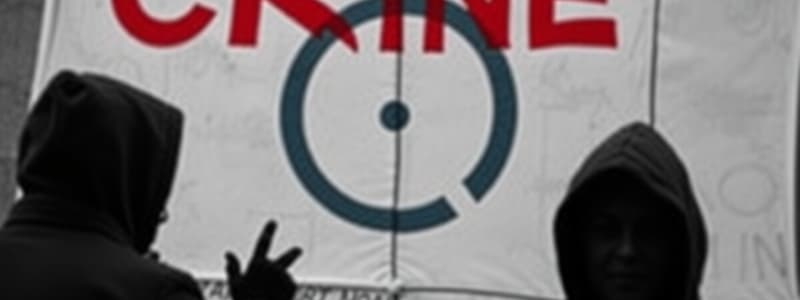Podcast
Questions and Answers
What is a central idea of Neo-Marxist theories regarding the nature of criminals?
What is a central idea of Neo-Marxist theories regarding the nature of criminals?
- Criminals are primarily influenced by biological factors.
- Criminals are victims of an oppressive economic system.
- Criminals make conscious choices to commit crime. (correct)
- Criminals often lack a conscious awareness of their actions.
According to the criticisms of Neo-Marxist theories, which of the following is NOT typically cited?
According to the criticisms of Neo-Marxist theories, which of the following is NOT typically cited?
- The theories overlook the motivations for male and female criminal behavior.
- Not all crimes are linked to political motives.
- Neo-Marxism fails to consider the psychological aspects of crime. (correct)
- The theories are seen as overly idealistic.
What element is considered the immediate origin of a deviant act in a fully social theory of crime?
What element is considered the immediate origin of a deviant act in a fully social theory of crime?
- Public response to the act.
- The societal stigmas associated with the act.
- The historical context surrounding the event.
- Specific factors leading up to the crime. (correct)
How does Neo-Marxism's view on capitalism contribute to crime and deviance?
How does Neo-Marxism's view on capitalism contribute to crime and deviance?
Which critique of Neo-Marxist theories highlights the disparity in criminal motivations among different genders?
Which critique of Neo-Marxist theories highlights the disparity in criminal motivations among different genders?
Why is capitalism considered criminogenic?
Why is capitalism considered criminogenic?
According to Gordon, what is a rational reaction to capitalistic influences?
According to Gordon, what is a rational reaction to capitalistic influences?
What does Pearce argue about the application of laws in capitalist societies?
What does Pearce argue about the application of laws in capitalist societies?
What factor do many theories ignore when explaining crime according to the evaluation section?
What factor do many theories ignore when explaining crime according to the evaluation section?
How does the existence of poverty relate to crime rates?
How does the existence of poverty relate to crime rates?
Flashcards
Neo-Marxist Theory of Crime
Neo-Marxist Theory of Crime
Neo-Marxist theory of crime argues that crime arises from capitalism's inherent inequalities and exploitation, motivating individuals to react against an unjust system.
Capitalism's Role in Crime
Capitalism's Role in Crime
Capitalism, driven by exploitation, creates social inequality, leading to criminal activity as a response to injustice in the system.
Elements of Social Theory of Crime
Elements of Social Theory of Crime
A social theory of crime analyzes the wider origins, immediate causes and social reactions to criminal activity, including effects of labeling.
Hall (1978) Mugging
Hall (1978) Mugging
Signup and view all the flashcards
Criminals as Conscious Actors
Criminals as Conscious Actors
Signup and view all the flashcards
Capitalism and Crime
Capitalism and Crime
Signup and view all the flashcards
Gordon's View on Crime
Gordon's View on Crime
Signup and view all the flashcards
Reiman's Ruling Class Crime
Reiman's Ruling Class Crime
Signup and view all the flashcards
Selective Application of Laws
Selective Application of Laws
Signup and view all the flashcards
Crime and Social Conditions
Crime and Social Conditions
Signup and view all the flashcards




